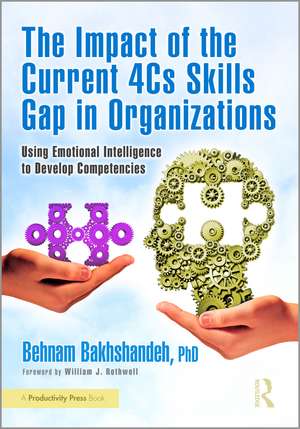The Impact of the Current 4Cs Skills Gap in Organizations: Using Emotional Intelligence to Develop Competencies
Autor Behnam Bakhshandehen Limba Engleză Paperback – 6 sep 2024
The 21st century has witnessed a rapid transformation in the global workforce and the skills required to thrive in it. Traditional knowledge-based skills alone are no longer sufficient to succeed in today’s complex and dynamic business environment. Instead, organizations increasingly value what is known as the "4Cs" skills: communication, collaboration, critical thinking, and creativity. However, a significant skills gap exists, where many employees lack these crucial abilities. This book explores the impact of the 21st-century 4Cs skills gap in organizations and how it affects their performance, innovation, and competitiveness.
The 21st-century 4Cs skills gap poses a significant challenge for organizations across industries. The inability to communicate effectively, collaborate seamlessly, think critically, and foster creativity can hinder productivity, innovation, and competitiveness. As the business landscape continues to evolve, addressing this skills gap is not only a necessity but also a strategic imperative for organizations looking to thrive in the 21st century. Bridging the gap through training, recruitment, and a commitment to a learning culture will be essential for success in the increasingly complex and interconnected world of business.
| Toate formatele și edițiile | Preț | Express |
|---|---|---|
| Paperback (1) | 329.23 lei 3-5 săpt. | +32.61 lei 6-12 zile |
| Taylor & Francis – 6 sep 2024 | 329.23 lei 3-5 săpt. | +32.61 lei 6-12 zile |
| Hardback (1) | 878.63 lei 6-8 săpt. | |
| Taylor & Francis – 6 sep 2024 | 878.63 lei 6-8 săpt. |
Preț: 329.23 lei
Nou
Puncte Express: 494
Preț estimativ în valută:
63.03€ • 65.76$ • 52.83£
63.03€ • 65.76$ • 52.83£
Carte disponibilă
Livrare economică 20 februarie-06 martie
Livrare express 05-11 februarie pentru 42.60 lei
Preluare comenzi: 021 569.72.76
Specificații
ISBN-13: 9781032611624
ISBN-10: 1032611626
Pagini: 386
Ilustrații: 74
Dimensiuni: 178 x 254 x 29 mm
Greutate: 0.71 kg
Ediția:1
Editura: Taylor & Francis
Colecția Productivity Press
Locul publicării:Oxford, United Kingdom
ISBN-10: 1032611626
Pagini: 386
Ilustrații: 74
Dimensiuni: 178 x 254 x 29 mm
Greutate: 0.71 kg
Ediția:1
Editura: Taylor & Francis
Colecția Productivity Press
Locul publicării:Oxford, United Kingdom
Public țintă
ProfessionalNotă biografică
Behnam Bakhshandeh, Ph.D., MPS (Author). Behnam's formal education includes a Ph.D. in Workforce Education and Development (WFED) with a concentration on Organization Development (OD) and Human Resources Development (HRD) from Pennsylvania State University, a master's degree in Professional Studies in Organization Development and Change (OD&C) from the Pennsylvania State University, World Campus, and a bachelor's degree in Psychology from the University of Phoenix.
He is also the founder and president of Primeco Education, Inc. (www.PrimecoEducation.com), a coaching and consulting company that has been working with individuals, teams, and organizations on their personal and professional development since 1993. He has authored and published many personal and professional development books. His latest book on the genre of supervisory, Successful Supervisory Leadership, Exerting Positive Influence While Leading People (2023), and before that, he published a book on the genre of Coaching, Transformational Coaching for Effective Leadership (2023).
He is also the founder and president of Primeco Education, Inc. (www.PrimecoEducation.com), a coaching and consulting company that has been working with individuals, teams, and organizations on their personal and professional development since 1993. He has authored and published many personal and professional development books. His latest book on the genre of supervisory, Successful Supervisory Leadership, Exerting Positive Influence While Leading People (2023), and before that, he published a book on the genre of Coaching, Transformational Coaching for Effective Leadership (2023).
Cuprins
Chapter One – Overview and Background Part I – Recognizing the Problem, and Role of 4Cs Skills Gap in the Economy Chapter Two - The 21st Century 4Cs Skills in Business Context Chapter Three - The External Element Impacting the Skills Gap Chapter Four – Skills Gap; a Present and Persistence Problem in Organizations Chapter Five– Impact of 4Cs Skills Gap in Economy Part II – Diagnosing the 4Cs Skills Gap and Evaluating Employees Chapter Six - Role of Needs Assessment in Competencies and Skills Development Chapter Seven – Identifying 4Cs Skills Gap Using Organization Diagnosis Models Chapter Eight – Evaluating and Supporting Students & Workforce on Their Progress Part III – Identifying What is Real and Present in Organizations Chapter Nine – Values Placed on 4Cs Skills by Organizations Chapter Ten – Impact of 4Cs Skills Gap on Team Performance Chapter Eleven – Effective 4Cs Skills Training and Development Chapter Twelve – Essence of Cohesiveness and Workability Part IV – Use Emotional Intelligence to Create Competency-Based Training Chapter Thirteen – Emotional Intelligence and Its Clusters Chapter Fourteen – Application of Emotional Intelligence Coaching Chapter Fifteen- 4Cs Skills Competency-Based Training & Development Via EI Chapter Sixteen – Implementation and Management of Training & Development Chapter Seventeen – Emotional Intelligence Coach Part V – Foresight, Summary and Final Thoughts Chapter Eighteen – Upskilling, Reskilling and Cross-Skilling Your Workforce Chapter Nineteen - Implications, Suggestions and Restrictions Chapter Twenty – Summary and Final Thoughts Chapter Twenty-One - Elements and Demographics of Study Appendix "A" – Supporting Resources
Descriere
The shortage of skills in the workforce is one of the major problems facing enterprises today.This book explores the impact of the 21st-century 4Cs skills gap in organizations and how it affects their performance, innovation, and competitiveness.
